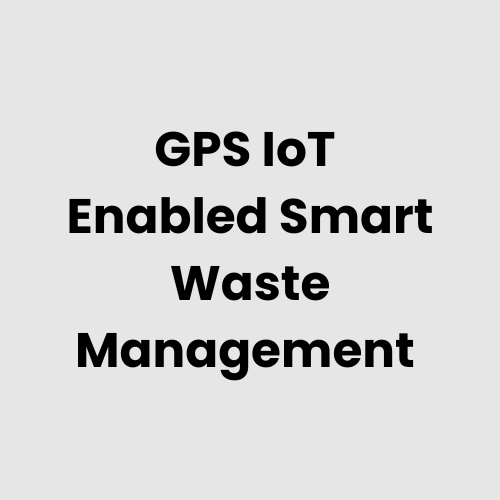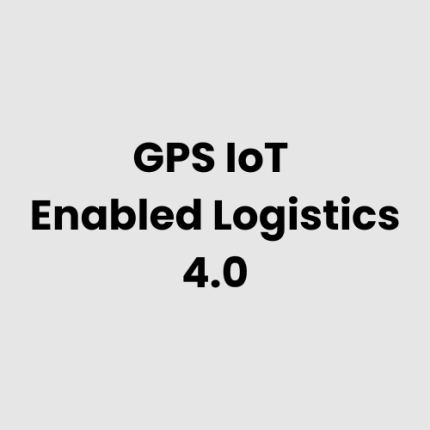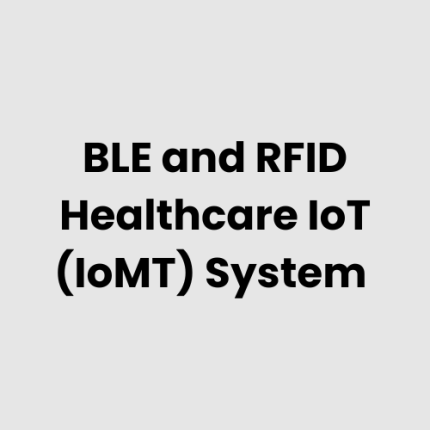Description
Technical Architecture
The GPS IoT Enabled Smart Waste Management System is designed to optimize waste collection processes and improve operational efficiency using Internet of Things (IoT) technology and GPS tracking. The system integrates several components, including smart waste bins, GPS tracking units, data aggregation platforms, and cloud-based analytics software. The architecture features data flow from waste bins to central processing units that enable real-time monitoring, reporting, and automated waste routing.
- IoT Sensors and Smart Bins: These bins are equipped with sensors (ultrasonic, weight, and temperature sensors) to monitor the fill levels, waste composition, and condition of the waste in real-time. GPS trackers are embedded in each bin to enable location tracking for optimal routing.
- Centralized Data Processing Unit: Data from the sensors is sent to a local or cloud-based server for processing. This system aggregates data from various smart bins, providing actionable insights such as fill levels, collection frequency, and waste patterns.
- Cloud Integration and Data Analytics: The collected data is transferred to a cloud platform where it is analysed using AI algorithms to optimize waste collection routes, predict waste production, and schedule pickups accordingly.
- Mobile Application and User Interface: Municipal or facility manager’s access data through a mobile app or web interface, enabling them to monitor performance, review reports, and manage waste collection schedules efficiently.
Hardware of GPS IoT Enabled Smart Waste Management System
- Smart Waste Bins: Equipped with fill-level sensors, GPS trackers, and communication modules to transmit data.
- GPS Tracking Units: For monitoring the exact location of bins in real-time.
- IoT Sensors: Ultrasonic, infrared, and weight sensors that measure bin fill levels and environmental conditions.
- Edge Computing Devices: For preliminary data processing and ensuring reliable communication from sensors to central servers.
- Communication Modules: Using technologies like LoRaWAN, NB-IoT, or Wi-Fi to transmit data to central platforms.
- Data Aggregation Servers: To collect and pre-process the data before sending it to the cloud or local servers.
- Mobile and Web Interfaces: To provide real-time data analytics and reporting to waste management teams.
Physical Placement Considerations of the Hardware
- Smart Waste Bins: These bins should be placed in high-traffic areas such as public parks, shopping malls, or street corners. The bins must be easily accessible but not obstructing pathways.
- GPS Units: These should be securely attached to each bin to avoid theft or damage, ensuring that the GPS data remains accurate.
- Communication Units: Depending on the connectivity type, the communication devices should be placed in areas with strong signal reception (e.g., urban areas with Wi-Fi or cellular coverage).
- Edge Computing Devices: These devices should be located in centralized hubs, typically in waste collection vehicles or central waste processing areas, to process data before transmission.
Hardware Architecture of GPS IoT Enabled Smart Waste Management System
The hardware architecture of the GPS IoT Enabled Smart Waste Management System consists of the following components:
- Waste Bins with IoT Sensors: Sensors track fill levels, environmental conditions, and GPS location.
- Communication Network: The communication devices relay data from waste bins to the central server or cloud platform using secure protocols like LoRaWAN or 5G.
- Edge Computing: Edge devices aggregate and pre-process data locally to reduce latency and optimize processing time.
- Cloud Platform: Data is transmitted for analysis, reporting, and to trigger automated actions like waste collection scheduling or alert notifications.
- Data Analytics Engine: This component uses AI algorithms to optimize waste collection routes and predict future waste patterns.
- Mobile and Web User Interface: Waste management teams and city planners access real-time analytics and reports via dedicated apps or web dashboards.
Deployment Considerations of GPS IoT Enabled Smart Waste Management System
- Scalability: The system should be designed to scale across multiple regions or cities, allowing for easy addition of more smart bins and tracking units as needed.
- Connectivity: A stable and secure communication network (Wi-Fi, LoRaWAN, NB-IoT) should be established to ensure continuous data transmission between the waste bins and the central servers.
- Power Supply: Devices such as GPS trackers and sensors require a reliable power source. Solar panels can be used in outdoor environments, while battery-powered units can be employed in more confined spaces.
- Data Security: Ensuring data protection is crucial. The system must implement strong encryption protocols for data transmission and storage.
- Maintenance and Monitoring: Regular maintenance of hardware components is essential to ensure system reliability. Predictive maintenance can be employed using the data from the system itself to detect potential hardware failures before they occur.
List of Relevant Industry Standards and Regulations
- ISO/IEC 27001 – Information security management systems
- ISO 9001 – Quality management systems
- EN 301 489 – Electromagnetic compatibility (EMC)
- IEEE 802.15.4 – Standard for low-rate wireless personal area networks
- General Data Protection Regulation (GDPR)
- National Institute of Standards and Technology (NIST) Cybersecurity Framework
- Waste Electrical and Electronic Equipment (WEEE) Directive
- Resource Conservation and Recovery Act (RCRA)
- Occupational Safety and Health Administration (OSHA) standards
- International Telecommunication Union (ITU) regulations for IoT communication
Local Server Version
The GPS IoT Enabled Smart Waste Management System can be configured to run on a local server for businesses or municipalities that prefer to manage their data in-house rather than relying on a cloud-based solution. This version allows for:
- On-premises data processing: Data can be stored and analysed locally, ensuring that sensitive information remains within the organization’s network.
- Enhanced control: Local servers allow for greater customization of the system to meet specific operational needs.
- Reduced latency: Processing data locally reduces the need for continuous internet connectivity and lowers latency, enabling faster decision-making.
Cloud Integration and Data Management
For broader scalability and accessibility, the GPS IoT Enabled Smart Waste Management System can be integrated with cloud platforms. This approach offers several advantages:
- Real-time Data Accessibility: Data is available on-demand from anywhere, accessible via mobile or web-based platforms for managers and city officials.
- Data Analytics and Reporting: The cloud-based system uses advanced AI and machine learning algorithms to analyse waste patterns, predict future waste loads, and optimize collection routes.
- Seamless Integration: The system can integrate with existing municipal or corporate infrastructure for smart city applications or sustainability initiatives.
- Automatic Updates and Upgrades: The cloud-based system can be remotely updated with new features and security patches, reducing the burden of on-site management.
At GAO Tek Inc., we are committed to providing robust and reliable GPS IoT Enabled Smart Waste Management solutions that help cities and businesses optimize their waste management processes, reduce costs, and contribute to environmental sustainability.
GAO Case Studies of GPS IoT Enabled Smart Waste Management System
- New York City, NY
In New York City, a GPS IoT-enabled waste management system was implemented to optimize waste collection in densely populated neighbourhoods. Sensors in waste bins track fill levels, allowing for dynamic scheduling of pickup routes. This initiative significantly improved operational efficiency, reduced fuel consumption, and minimized traffic congestion. - Los Angeles, CA
A smart waste management solution was deployed in Los Angeles to improve the city’s recycling efforts. By using GPS trackers in waste bins, the city was able to ensure that recyclables were picked up efficiently, reducing contamination rates and boosting recycling effectiveness across urban areas. - Chicago, IL
In Chicago, a GPS IoT-enabled waste system was installed to streamline waste collection in busy commercial districts. The system helped reduce unnecessary collections and provided real-time data for better route planning, improving both cost-efficiency and reducing the environmental footprint of the waste management operations. - Miami, FL
A smart waste management solution was introduced in Miami’s urban areas to address waste overflow problems. GPS-enabled bins equipped with fill sensors allowed for real-time monitoring, helping the city optimize waste collection routes, minimize delays, and reduce operational costs. - San Francisco, CA
In San Francisco, a GPS IoT waste management system was integrated into the city’s public waste collection strategy. By monitoring fill levels remotely, the system optimized collection times and routes, ensuring timely waste removal and contributing to the city’s sustainability goals. - Dallas, TX
Dallas implemented a smart waste management system with GPS-enabled sensors in waste bins across the city. The system allowed for predictive waste generation models, enabling the city to adjust collection schedules in real-time and optimize resource allocation for waste management. - Washington, D.C.
In Washington, D.C., a smart waste system using IoT technology helped optimize waste collection across government buildings and public spaces. GPS trackers on waste bins improved route optimization, reducing fuel costs and lowering the carbon emissions from waste trucks. - Phoenix, AZ
Phoenix’s municipal waste management system utilized GPS and IoT-enabled sensors to manage waste bins throughout residential and business districts. The data-driven approach allowed the city to dynamically adjust collection frequencies and routes, significantly enhancing operational efficiency and reducing environmental impact. - Houston, TX
Houston’s waste management strategy adopted a GPS IoT solution to monitor waste levels and manage collection routes. The system contributed to reducing the frequency of waste pickups in low-demand areas and provided real-time data for operational improvements. - Boston, MA
In Boston, GPS IoT-enabled waste management systems were deployed to monitor waste bins in both residential and commercial areas. The system helped the city optimize pick-up routes, minimize truck emissions, and reduce the overall cost of waste management operations. - Seattle, WA
Seattle’s smart waste management system utilized IoT sensors to provide live data on the fill status of waste bins in high-traffic areas. By analysing this data, the city was able to optimize collection schedules, cut down on fuel usage, and ensure cleaner public spaces. - Denver, CO
Denver employed GPS IoT technology to modernize its waste collection network. The system’s real-time data tracking and route optimization significantly reduced the environmental impact by cutting unnecessary travel time and fuel consumption while maintaining timely waste collection. - Atlanta, GA
In Atlanta, the city adopted GPS-enabled smart waste bins equipped with IoT sensors to monitor fill levels in both public spaces and commercial properties. The system helped streamline waste collection operations, reduce truck emissions, and improve the city’s recycling efforts. - Philadelphia, PA
Philadelphia’s waste management program incorporated IoT-enabled waste bins with GPS tracking. This innovation allowed the city to track waste levels and optimize waste collection, ensuring that bins were emptied only when necessary, thus reducing costs and increasing the sustainability of operations. - Las Vegas, NV
Las Vegas implemented a GPS IoT-based waste management solution across hotels, casinos, and entertainment venues. With real-time monitoring of waste bins, the city optimized collection routes and schedules, ensuring waste was collected on time and reducing the environmental footprint of the collection process.
Canada Case Studies of GPS IoT Enabled Smart Waste Management System
- Toronto, ON
In Toronto, a GPS IoT waste management system was deployed to monitor waste levels in public spaces and residential areas. The data from smart bins helped the city optimize pick-up schedules, reduce truck emissions, and improve the overall efficiency of waste collection operations. - Vancouver, BC
Vancouver adopted a GPS IoT-enabled smart waste management system to enhance its recycling efforts. By tracking the fill levels of waste bins in real-time, the city was able to optimize waste collection routes, reducing waste overflow and contributing to its goal of becoming a zero-waste city.
Navigation Menu for GPS IoT
- GPS IoT Trackers/Devices
- GPS IoT Tracking Accessories
- GPS IoT Tracking Resources
- GPS IoT – Cloud, Server, PC & Mobile Systems
Navigation Menu for IoT
- LORAWAN
- Wi-Fi HaLow
- Z-WAVE
- BLE & RFID
- NB-IOT
- CELLULAR IOT
- GPS IOT
- IOT SENSORS
- EDGE COMPUTING
- IOT SYSTEMS
Our products are in stock and can be shipped anywhere in the continental U.S. or Canada from our local warehouse. For any further information, please fill out this form or email us.
We are actively looking for partners who are like us located in the U.S. and Canada. For more information on partnering with GAO, please visit Partner with GAO Tek Inc. It lists various ways to partner with GAO, such as OEM Partnerships, Technology Integration, Distribution and Reselling Opportunities, Presenting at the Leading Event Tek Summit, Joint R&D Projects, Training and Consulting Services, Industry-Specific Collaborations, Research and Academic Partnerships.



